The proper nutrition to lose weight begins to interest us from the moment we understand that diets do not help. Diets don't help - that's a fact. Because? The answer lies in the rife prohibitions and restrictions on familiar, modern diets, "proven over the years. "Proper nutrition for weight loss should be varied, healthy and nutritious, however strange it may seem. There are several fundamental principles of such nutrition. Also a lot of misconceptions, misconceptions, stories about fantastic superfoods, blacklists of "harmful foods" as well as stories about your wonderful rehabilitation.

Before starting a conversation about nutrition, you need to understand that in the last few years, more precisely, in the last 25-30 years, the balance of basic nutrients - proteins, fats and carbohydrates - has been greatly shifted towards the carbohydrate component. At the same time, you don't have to work hard and calculate too much - just go to any store and look in candy windows. They take up almost a quarter of the store's space! And the first step in switching to a proper weight loss diet will be a complete rejection of sugar in the daily diet. Sounds scary, right? You know why? Because sugar addiction is similar to drug addiction.
- Well, it started. . . - someone will say disappointed, - Again prohibitions and restrictions!
A few minutes of your attention and you'll agree that giving up sugar can be a big step forward in improving your body's health and, consequently, weight loss.
We need carbs, of course. But which ones? We've all heard about fast and slow carbs. We need some slow ones. Cereal-based dishes, wholemeal flour, vegetables . . . Berries and berries are full of fast carbohydrates, but it's better to eat fruits and berries than buy sweets from the pastry shop. Many nutritionists propose to decisively and abruptly abandon carbohydrates of any kind, reducing their consumption to 20-50 g per day. Such a sudden transition from the usual to the useful can lead to dizziness, loss of energy, moodiness, and the conviction that it's not that useful and that it's about proper nutrition.
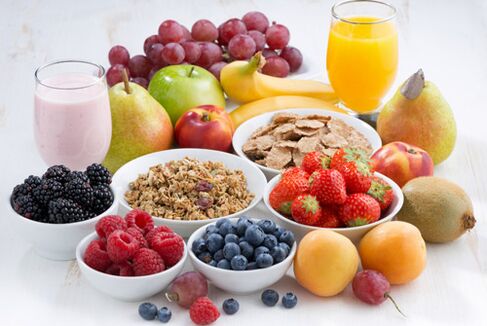
Proper weight loss nutrition will bring you much more benefit and joy if you switch to it gradually, consistently and don't get lost. But first you need to understand why our bodies so stubbornly resist any change, especially a decrease in the amount of sugar.
Sugar is really the scourge of our time. Few products offered to us in supermarkets lack even a teaspoon of sugar. We're not even talking about candy right now! Juices, yoghurts, marinades, sauces, semi-finished meat products, sausages and sausages, fish preserves, instant soups, instant noodles . . . The list is almost endless! How much more dire is the next transition to new nutrition principles - it turns out we have almost nothing to eat!? Don't panic, there's a way out and it's quite peaceful.
Proper nutrition for weight loss starts with three steps.
Step one:remove the sugar in its pure form. Tea, coffee, unsweetened jams. We refuse jams, jams, sweets, chocolates, biscuits and other treats from tea with friends or during work breaks. Ice cream, cakes and even low-calorie marshmallows are excommunicated from our table! All carbonated beverages are prohibited. Try going without sugar for two weeks, just two weeks - you'll be surprised. Tea, it seems, tastes different. Coffee too. Cocoa with milk, but without sugar, carries better than any stimulant. And what should be served with tea? At this stage, nuts (not salted), dried fruits, energy mixes with honey (mixture of nuts and dried fruits, put in a meat grinder, you can add lemon), sandwiches with butter (yes, yes! ), Cheese and sausage normal, and best with homemade pork, caviar, lightly salted salmon, etc. At the same time, tea with all these goodies should be included with breakfast, lunch or dinner, and not be a regular snack. However, about snacks a little later.
Step two:When the body switches from fast to slow carbs, it's time to eliminate foods with a high glycemic index: premium wheat flour, white rice and potatoes. That is, all buns, breads, pies, porridges made from husked rice, semolina porridges, as well as favorite manna and potato pies of all kinds, are automatically transformed from everyday food into a delicacy. Yes, and now the soups will also run out of potatoes. At the same time, rye bread and baked goods made from whole wheat flour (no sugar, remember? ), steamed buckwheat or simply washed down with clean water overnight, instant oats, are very well mixed with fermented dairy products, as well as all exotics or forgotten cereals like spelled, quinoa. Also, you need to remove frankly sweet fruits from your diet - bananas, grapes, pears. Berries are not included in this list due to their high acid content.
Step three:at this stage, you should drop all carbohydrates, leaving only the natural carbohydrates that are part of veggies and berries. However, sometimes the first two steps are enough to significantly reduce the weight. And if you fulfill a few more conditions at the same time, you won't have to look for a new diet for yourself - you'll move to a whole new level, where proper nutrition comes first and for life.
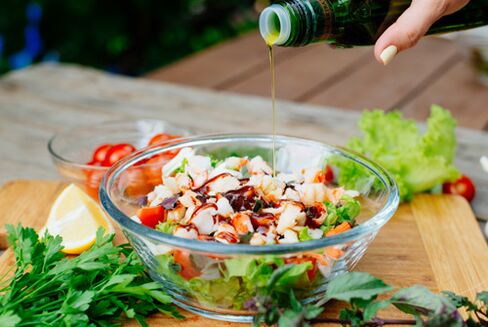
Proper nutrition for weight loss must be varied.This means that the balance must include not only the famous BJU (proteins, fats and carbohydrates) but also vitamins and trace elements. And if carbohydrates bring us energy in a pure and affordable way, then it's much harder for the body to get that energy from proteins and even more from fats. But as is often the case, what's hard to get is often the most useful. Carbohydrate calories are often excessive, our bodies expend almost no effort in processing them, which is why "sugar calories" fit so quickly into cozy fat rolls.
Proteins are vital for our body.Protein is important throughout life: in childhood it is a building material, in adulthood it is an element that helps our bodies to function and remain at its best for as long as possible. Judge for yourself: protein plays a protective role, helping with antibody production, transport, the most famous protein hemoglobin provides oxygen to all cells, regulatory - normal hormone production is impossible without protein, motor - all kinds of movement are provided by myosin and actin proteins, plastic - the collagen protein is responsible for the state of the connective tissue, the appearance of the skin, etc. , energy - proteins provide energy to the body. But perhaps one of the most important tasks of a protein is the preservation and transmission of gene information. The increasingly common terrible disease "Alzheimer's Disease" is believed to be directly related to insufficient protein intake (not only with it, but the second most important component a little lower).
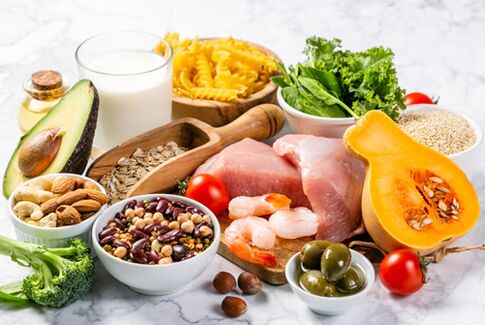
How much protein does the average adult need? Many nutritionists, doctors and advocates of proper nutrition follow the protein intake standards deduced over a hundred years ago by German scientist Max Rubner, and that standard was 0. 33 g of protein per 1 kg of human weight. Much has changed since then, science has advanced and recent studies have deduced a highly average rate of 1. 2 - 2. 0 g per 1 kg of weight. An impressive difference. Also, those 1, 2 - 2. 0 g is not the weight of the product, say a piece of meat or a serving of beans, but the pure protein content in the product. A sample table of high protein foods is available on our website. Our website has written about the benefits of protein products more than once, but it never hurts to repeat these common truths.
Despite the great popularity of vegan, raw and vegetarian diets, we still need at least 50% animal protein to keep the body healthy and not in a survival state. They are eggs, dairy products, fish and seafood, meat and offal. It is these proteins that have a complete set of amino acids, unlike plant foods. Although they should be eaten, because variety is the essence of proper nutrition!
Of course, there are few products on our planet that consist of a single substance. Almost every food is a combination of proteins, carbohydrates and fats. And here with the last ingredient - fats - perhaps the biggest criminal story in the history of nutrition science happened. In a "perfect" moment, fats were declared the enemy of health. Everyone has heard horror stories about cholesterol, plaque in blood vessels and other horrors. And looking at how stores restock their assortment with low-fat or completely low-fat products at an enviable speed, you begin to doubt the sincere desire to feed us "correct", "healthy", "alive" food , because there is nothing correct and useful in the absence of fat in the diet.
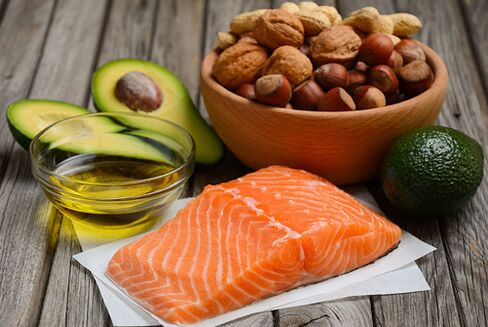
So what is the function of fats in our bodies? You will say - it helps in the assimilation of fat-soluble vitamins. That is all? In high school biology classes, someone will remember the heat exchange function of fats. Thus, the most important function of fats in the body is the metabolism of the sufractants, that is, in simple terms, guaranteeing the exchange of oxygen in the alveoli of the lungs. Fat coats the alveolar walls in a thinner layer and allows us to breathe and . . . to live. My grandmother's methods of treating lung disease immediately come to mind: badger fat, dog fat, goose fat, hot milk and butter - fat is everywhere, inside and out, and that helped! And, by the way, it still helps, the only drugs for the treatment of hypoxia (lack of oxygen), which now sell for a lot of money, in fact, it's a fat emulsion. Another important function of fats is membrane synthesis. The cell membrane is composed of 70-85% fat, and the function of the membrane is to ensure the protection of cells, their thermal insulation and selective permeability (since not everything that seeks to enter the cell is useful and necessary for this). The myelin layer, that insulating sheath of our nerves, is 70-80% saturated fat. No myelin - get Alzheimer's disease, senile sclerosis (much younger) and dementia. Fat is one of the most important substances vital for the construction of membranes, the myelin sheath, ensuring its functioning, as well as the functioning of the central and peripheral nervous system. Keep this in mind when choosing between 0, 5 and 3, 2% fat in milk.
Another important function of fats is hormonal. Fats are the sources of hormone synthesis, and there are a large number of them in our bodies. These are growth hormones, protein hormones, thyroid hormones, digestive system hormones, steroid hormones, adrenal hormones, sex hormones, etc. Of course, the slightest bias, the underproduction of any hormone threatens major disruptions in the functioning of the entire organism. A sudden onslaught of blackheads and acne, all types of rashes are a sign of low androgen levels. Frequent "no reason" headaches can be a sign of low estrogen levels. Constant insomnia - insufficient progesterone. Fatigue, tiredness and even tiredness, even during rest, can be signs of violation of the production of thyroid hormones. Hair loss is also a sign of this disorder. Weight gain may be due to high levels of the hormones estrogen, cortisol and insulin, along with low levels of testosterone. Forgetfulness and distraction are indicators of low levels of estrogen and cortisol. How everything is connected!
Fats are responsible for regulating heat. That's why men who don't diet tend to taste better than women who are constantly losing weight. Constant freezing of the hands and feet is probably a sign of fat deficiency, if not some kind of congenital quirk. The most famous function of fats is to dissolve and aid in the absorption of fat-soluble vitamins: A, E, D, K. Going on a low-fat diet and drinking vitamin complexes - not an option, the vitamins simply won't be absorbed .
And last but not least - vitamins, minerals, macro and microelements. These substances are found in different amounts and combinations in all products, but special attention should be paid to fresh vegetables, roots, fruits and berries. One of the most valuable vitamins - vitamin C - is not synthesized in our body and can only be obtained from fresh vegetable products. Our site has filled an entire section on vitamins, read on, it's helpful! Plant foods contain enzymes and flavonoids, all kinds of minerals, without which we simply cannot function normally. For example, potassium - the work of the heart without it will be interrupted. Magnesium is responsible for brain, nervous and hormonal health and is involved in metabolic processes. And also in vegetable products there is fiber - without it, the processes of digestion and peristalsis are almost impossible!
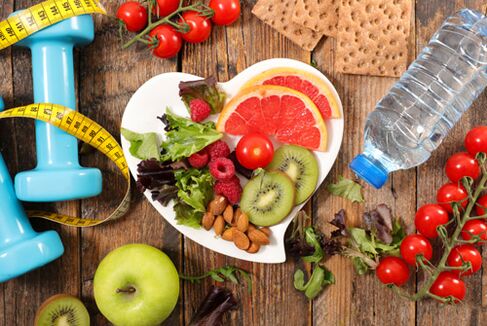
Proper nutrition to lose weight and improve the body includes the following principles:
Eat no more than three times a day. Unexpected, right? But what about 5 to 6 meals a day advertised in many recommendations? These fractionated meals are perfect for children, athletes and critically ill citizens. If you're not in any of these categories, eat three or even twice a day.
Eat only when you feel hungry, not at night. Breakfast is optional! If you don't want to eat in the morning, reschedule breakfast a few hours later. Don't stuff food into yourself just because someone says breakfast is the most important thing.
Learn to listen to yourself and understand the difference between hunger and the usual habit of mixing something in between. The following recommendation will help with this.
Drink water. Not in liters, as is sometimes advised. Not boiled. Ideally bottled or in spring. The drinking regimen is simple to disgrace: 2 glasses of lukewarm water (not cold and not boiling) in the morning, 1-2 glasses during the day and 1 in the evening. Sometimes you just have to drink water to understand that it was just thirst, not hunger.
Get into the habit of buying all kinds of nuts and seeds more often. In addition to fats, they contain a lot of macro and microelements.
Eat whole foods. That is, not without fat! Cottage cheese - 9% fat, no less, but with sour cream, coffee with cream, butter sandwiches, greasy cheeses, fatty sea fish, exotic avocado, bacon! This is not a typical "fire to fire" diversion. A measure is needed on everything, of course.
Don't forget about protein! But no less important is what to match it with. And this recommendation will be the last.
Eat vegetables. Lots of vegetables and herbs. Fresh, pickled, pickled, steamed, boiled and even fried in oil! But of course fresh salads are preferable. It's not difficult to calculate the amount of vegetables: mentally divide your plate into two parts - half will be occupied by vegetables, and the second will contain proteins, fats and the same minimum allowed carbohydrates.
Proper weight loss nutrition does not consist of rigid tables and recipes. This is a deliberate approach. All of these tips will only work if there is an almost complete rejection of carbohydrates. If you combine protein with carbohydrates (mashed potatoes and chops) or fats with carbohydrates (bacon and bread) in one dish, it's all over. More precisely, no, of course, you will not die immediately. You'll just live, sighing forgiveness with every new pound and complaining about the injustice ("I'm literally sitting in the same water, where does the fat come from??? "). No need to sit in water, no need to gnaw at hunger, diet products. Just start with three steps and walk without turning to health and beauty.














































































